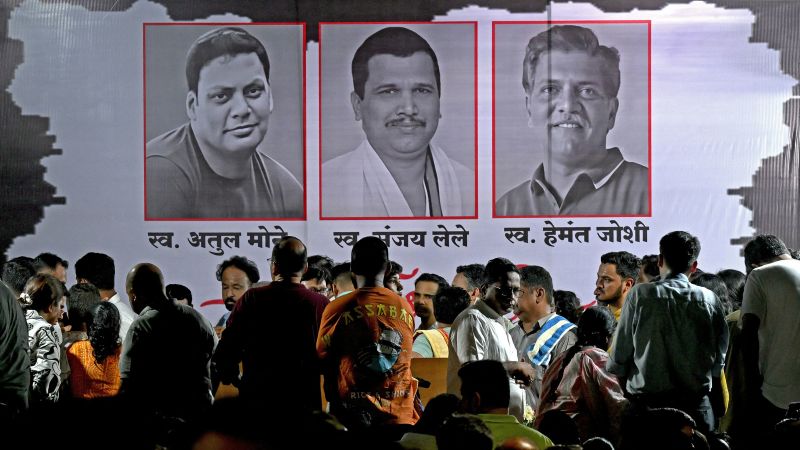By Vidushpat Singhania, Nachiket Yagnik Continues below advertisement window.addEventListener("load", function() { let ad_unit_fire_time = 1000; if(ad_delay_time_abp > 0){ ad_unit_fire_time = parseInt(ad_delay_time_abp) + 500; } setTimeout(function () { googletag.cmd.
push(function() { googletag.display("div-gpt-ad-9167143-2"); }); },ad_unit_fire_time) }); The Indian Real Money Gaming ( RMG ) sector is amongst the fastest-growing sectors of India, driven by technological growth, mobile penetration, and a young demographic. Despite the boost, however, the RMG sector suffers from inconsistencies in how different forms of RMG, such as lotteries, fantasy sports, poker, rummy, and online casinos, are regulated under India’s legal regime.

There have been murmurs that, besides the Tamil Nadu government, which has sought to regulate online skill gaming through its Tamil Nadu Online Gaming Authority, the states of Karnataka and Maharashtra are considering regulations for the online gaming industry. A news report earlier had suggested that even the Union Government of India is considering the regulation of the entire online gaming industry. Continues below advertisement window.
addEventListener("load", function() { let ad_unit_fire_time = 1000; if(ad_delay_time_abp > 0){ ad_unit_fire_time = parseInt(ad_delay_time_abp) + 500; } setTimeout(function () { googletag.cmd.push(function() { googletag.
display("div-gpt-ad-1253031-3"); }); },ad_unit_fire_time) }); Lotteries Lotteries are governed by the Lotteries (Regulation) Act, 1998 and the various central and state rules made thereunder. While clearly understood as being games of chance, state-run lotteries are permitted. Such lotteries are often justified as tools for raising public welfare funds, which grants them a certain level of acceptance amongst the population.
However, private lotteries remain strictly forbidden in India. Lotteries are subject to a 28 per cent Goods and Services Tax (GST) on the face value of tickets and a 30 per cent tax on winnings. Unlike other RMG segments, lottery operators (appointed by respective state governments) are shielded from many operational challenges.
Their state endorsement also provides an added layer of legitimacy that private RMG operators struggle to obtain. Fantasy Sports The High Courts of Punjab & Haryana, Bombay and Rajasthan, amongst other, have passed favourable judgments that recognise fantasy sports as games of skill. Courts of law have accepted the arguments raised by such platforms and ruled that outcomes in fantasy sports depend on an individual’s knowledge, research, analysis, etc and are predominantly games of skill.
This has empowered fantasy platforms to expand operations across states. While a uniform 28 per cent GST is imposed on the full-face value of entry fees for all online gaming, including fantasy sports, these platforms still benefit from regulatory clarity and widespread user acceptance. Rummy Vs Poker The Supreme Court of India unequivocally recognised rummy as a game of skill through its judgment in the case of State of Andhra Pradesh v.
K. Satyanarayana , providing rummy operators with a solid legal foundation to operate across state jurisdictions. Poker, however, lacks such nationwide judicial backing.
Consequently, poker continues to be regulated on a state-by-state basis. While Gujarat has sought to ban a variation of Poker, other states like Tamil Nadu, West Bengal, Uttar Pradesh, Karnataka and Nagaland specifically classify poker as a game of skill. This leads to a patchwork of rules and frequent legal challenges for poker operators.
This uncertainty severely hampers the growth of poker platforms, deters investment, and undermines user confidence. Other RMG Segments Online casinos and betting platforms are clubbed under the broad label of "gambling" and governed by state laws, which are modelled on legislation like the Public Gambling Act, 1867. Many states still interpret this law strictly, banning most forms of online wagering.
At this juncture, only the states of Goa and Sikkim permit the provision of casino games for real money and that too strictly on an intra-state basis. Furthermore, the current practice of levying 28 per cent GST on the full-face value of bets, instead of on the gross gaming revenue, makes the business model unsustainable for many operators, especially when coupled with fluctuating user engagement and legal risk. The Way Forward Despite being pegged as one of India’s sunrise sectors, the labyrinth of confusing regulations/decisions on the online RMG industry is a threat to the potential growth of the sector.
There is a pressing need for a central regulatory authority and a harmonised legal framework to ensure fair competition and user protection. With multiple state governments considering their regulation of the industry, differing compliance norms might likely emerge. This will increase compliance costs on the operators and create further confusion.
Ultimately, a balanced and transparent regulatory regime is essential to support innovation, attract investment, and foster responsible gaming in India. This can only be achieved through a central comprehensive regulation for the entire ambit of the online gaming industry, from lottery to betting to skill gaming. The Union government of India could have an interaction with the regulators of online gaming worldwide to understand their approach, on how they have tackled problems, when coming up with an approach which is unique to India.
(Singhania is Managing Partner at Krida Legal, specialising in gaming laws. Yagnik is Managing Associate at Krida Legal as well as sports, gaming and entertainment lawyer.) Disclaimer: The opinions, beliefs, and views expressed by the various authors and forum participants on this website are personal and do not reflect the opinions, beliefs, and views of ABP Network Pvt.
Ltd..
Gaming Vs Gambling: Where Does India's Legal Framework Draw The Line?

By Vidushpat Singhania, Nachiket YagnikThe Indian Real Money Gaming (RMG) sector is amongst the fastest-growing sectors of India, driven by technological growth, mobile penetration, and a young demographic. Despite the boost, however, the RMG sector suffers from inconsistencies in how different forms of RMG, such as lotteries, fantasy sports, poker, rummy, and online casinos, are regulated under India’s legal regime. There have been murmurs that, besides the Tamil Nadu government, which has sought to regulate online skill gaming through its Tamil Nadu Online Gaming Authority, the states of Karnataka and Maharashtra are considering regulations for the online gaming industry. A news report earlier had suggested that even the Union Government of India is considering the regulation of the entire online gaming industry.LotteriesLotteries are governed by the Lotteries (Regulation) Act, 1998 and the various central and state rules made thereunder. While clearly understood as being games of chance, state-run lotteries are permitted. Such lotteries are often justified as tools for raising public welfare funds, which grants them a certain level of acceptance amongst the population. However, private lotteries remain strictly forbidden in India. Lotteries are subject to a 28 per cent Goods and Services Tax (GST) on the face value of tickets and a 30 per cent tax on winnings. Unlike other RMG segments, lottery operators (appointed by respective state governments) are shielded from many operational challenges. Their state endorsement also provides an added layer of legitimacy that private RMG operators struggle to obtain.Fantasy SportsThe High Courts of Punjab & Haryana, Bombay and Rajasthan, amongst other, have passed favourable judgments that recognise fantasy sports as games of skill. Courts of law have accepted the arguments raised by such platforms and ruled that outcomes in fantasy sports depend on an individual’s knowledge, research, analysis, etc and are predominantly games of skill.This has empowered fantasy platforms to expand operations across states. While a uniform 28 per cent GST is imposed on the full-face value of entry fees for all online gaming, including fantasy sports, these platforms still benefit from regulatory clarity and widespread user acceptance.Rummy Vs PokerThe Supreme Court of India unequivocally recognised rummy as a game of skill through its judgment in the case of State of Andhra Pradesh v. K. Satyanarayana, providing rummy operators with a solid legal foundation to operate across state jurisdictions.Poker, however, lacks such nationwide judicial backing. Consequently, poker continues to be regulated on a state-by-state basis. While Gujarat has sought to ban a variation of Poker, other states like Tamil Nadu, West Bengal, Uttar Pradesh, Karnataka and Nagaland specifically classify poker as a game of skill. This leads to a patchwork of rules and frequent legal challenges for poker operators. This uncertainty severely hampers the growth of poker platforms, deters investment, and undermines user confidence.Other RMG SegmentsOnline casinos and betting platforms are clubbed under the broad label of "gambling" and governed by state laws, which are modelled on legislation like the Public Gambling Act, 1867. Many states still interpret this law strictly, banning most forms of online wagering. At this juncture, only the states of Goa and Sikkim permit the provision of casino games for real money and that too strictly on an intra-state basis. Furthermore, the current practice of levying 28 per cent GST on the full-face value of bets, instead of on the gross gaming revenue, makes the business model unsustainable for many operators, especially when coupled with fluctuating user engagement and legal risk.The Way ForwardDespite being pegged as one of India’s sunrise sectors, the labyrinth of confusing regulations/decisions on the online RMG industry is a threat to the potential growth of the sector. There is a pressing need for a central regulatory authority and a harmonised legal framework to ensure fair competition and user protection. With multiple state governments considering their regulation of the industry, differing compliance norms might likely emerge. This will increase compliance costs on the operators and create further confusion. Ultimately, a balanced and transparent regulatory regime is essential to support innovation, attract investment, and foster responsible gaming in India. This can only be achieved through a central comprehensive regulation for the entire ambit of the online gaming industry, from lottery to betting to skill gaming. The Union government of India could have an interaction with the regulators of online gaming worldwide to understand their approach, on how they have tackled problems, when coming up with an approach which is unique to India.(Singhania is Managing Partner at Krida Legal, specialising in gaming laws. Yagnik is Managing Associate at Krida Legal as well as sports, gaming and entertainment lawyer.)Disclaimer: The opinions, beliefs, and views expressed by the various authors and forum participants on this website are personal and do not reflect the opinions, beliefs, and views of ABP Network Pvt. Ltd.














